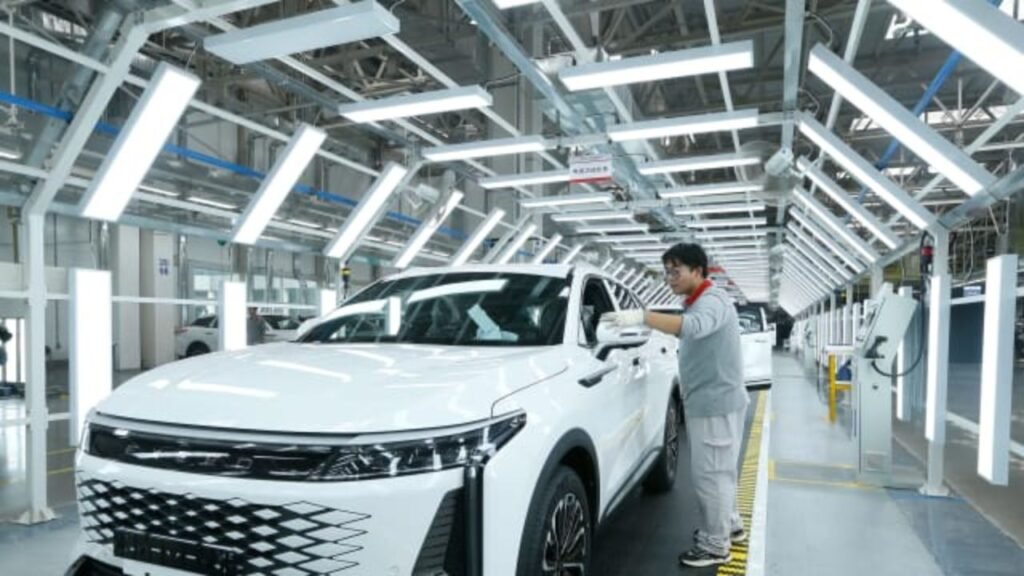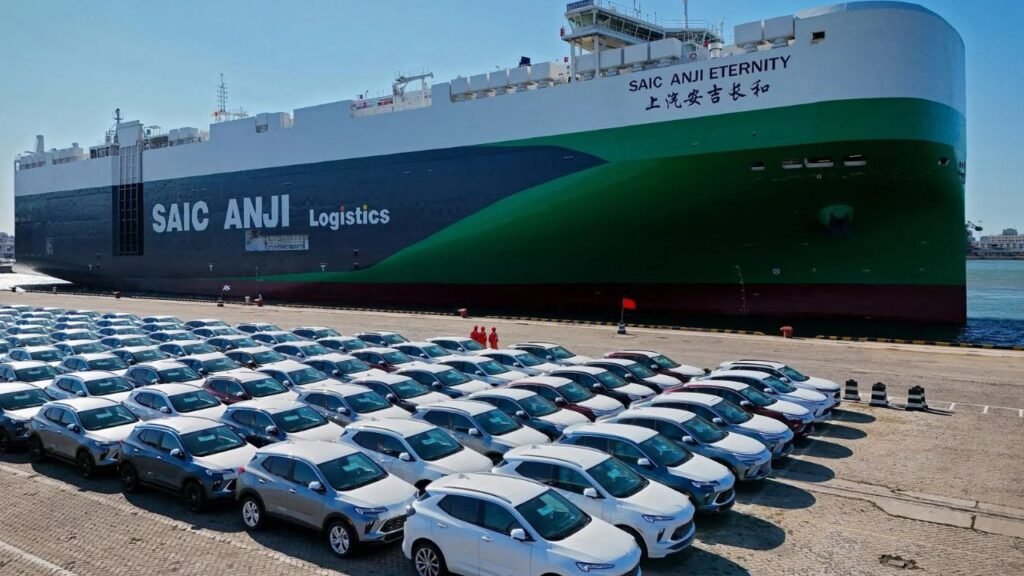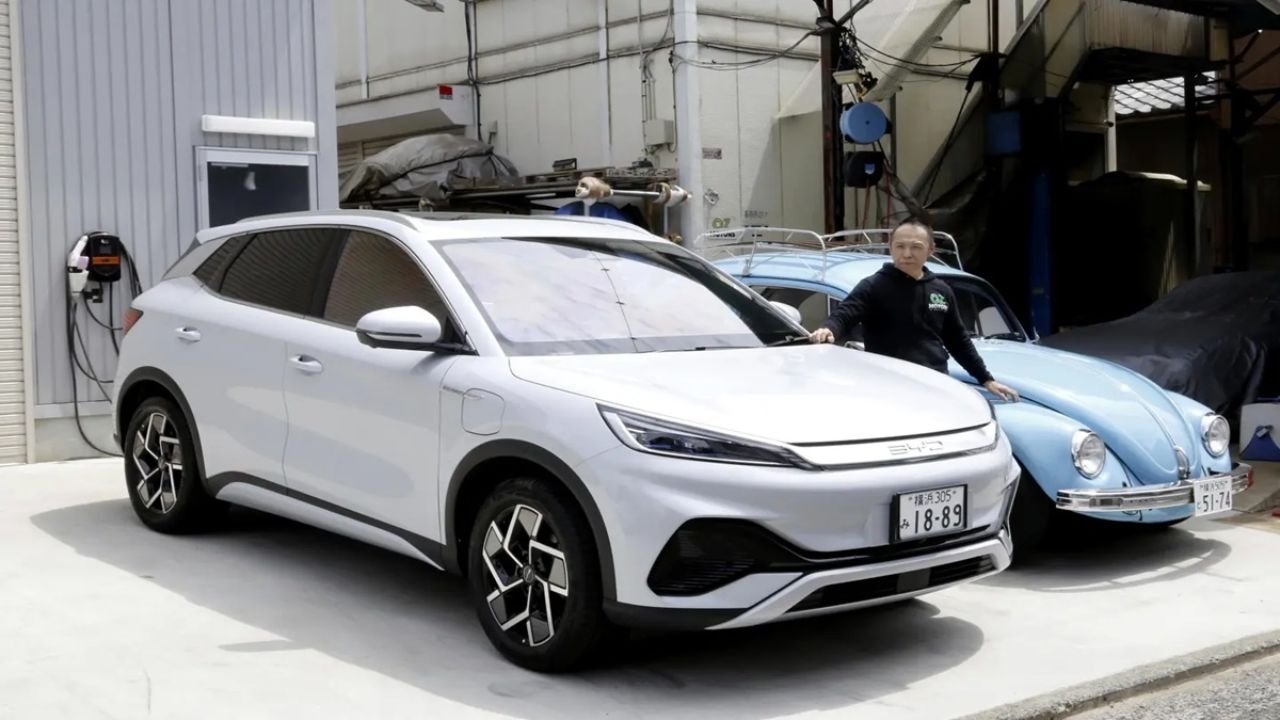“I drive an electric car because I’m poor,” says Lu Yunfeng, a private hire driver. He’s charging his vehicle at a station on the outskirts of Guangzhou, in southern China.
Standing nearby, Sun Jingguo agrees. “Driving a petrol car is too expensive. I save money by using an electric vehicle,” he says.
“And it’s also better for the environment,” he adds, leaning against his white Beijing U7 china electric car.
These are the kinds of comments climate activists dream of hearing. In many countries, electric vehicles are seen as luxury items — something only the wealthy can afford.
But in China, it has become a part of everyday life. In fact, in 2024, more than half of all cars sold in the country were electric.
At the start of this century, China’s leaders made a big plan to become the best in future technologies. Once known as a country where most people rode bicycles, China is now the world leader in electric vehicles (EVs).
For the more than 18 million people living in Guangzhou, the loud noise of rush hour traffic has now become a soft hum because of all the china electric car.
Michael Dunne, an expert on cars, says, “When it comes to electric vehicles, China is 10 years ahead and 10 times better than any other country.” China’s company BYD is now the top EV maker in the world, beating the US company Tesla earlier this year.
BYD’s huge sales are helped by China’s massive home market of over 1.4 billion people. Now, BYD and many other new Chinese companies want to sell affordable china electric car to people outside China too.
But how did China get so far ahead? And can other countries catch up?
The Master Plan

Experts say a big reason for China’s success is Wan Gang, a German-trained engineer who became China’s minister of trade and science in 2007.
He saw that China had become the biggest car market in the world. But the problem was, the cars on the streets of Beijing, Shanghai, and Guangzhou were mostly foreign brands like European, American, or Japanese cars.
Back then, Chinese car companies couldn’t compete with these big foreign brands when it came to quality and popularity. Those foreign companies had a strong lead in making petrol and diesel cars.
But China had other advantages — lots of resources, skilled workers, and many suppliers for car parts. So, Mr. Wan decided to change the game by focusing on electric cars instead.
This was the big plan.
Even though China included electric cars in its economic plans as early as 2001, it wasn’t until the 2010s that the government started giving huge financial support to grow the electric vehicle industry.
Unlike many Western countries, China can organize large parts of its economy to work toward its goals for many years. Its huge infrastructure projects and strong manufacturing industry prove this.
A US research group called the Center for Strategic and International Studies (CSIS) says that between 2009 and 2023, China spent about $231 billion on developing the electric vehicle industry.
Everyone in China — from people who buy cars to companies that make batteries and provide electricity — gets help and money when it comes to electric vehicles.
For example, BYD was encouraged to stop just making smartphone batteries and focus on making electric cars instead.
Another company, CATL, started in 2011 in the city of Ningde. It now makes about one-third of all the batteries used for electric vehicles worldwide. CATL supplies big car companies like Tesla, Volkswagen, and Ford.
Thanks to long-term plans and government money, China also controls important parts of the battery production supply chain.
China has also built the world’s biggest network of public charging stations. Most chargers are in big cities, so drivers are always just a few minutes away from charging their electric cars.

“If you want to make a battery for an electric car today, all roads lead through China,” says Mr. Dunne.
Some people call this “state capitalism.” Western countries say it is unfair business practice.
But Chinese electric car company leaders say that all companies, whether from China or other countries, get the same access to resources.
Because of this, they say China now has many new electric car companies, growing fast because of strong competition and a culture of new ideas.
Brian Gu, president of the electric car maker XPeng, told the BBC, “The Chinese government is doing the same things as Europe and the US — supporting policies, encouraging customers, and building infrastructure.”
“But I think China has done it consistently and in a way that creates the most competitive market. No one is favoured,” he added.
XPeng is one of the “Chinese champions,” as Mr. Gu calls it, helping to push the industry forward. The company is less than ten years old and has not yet made a profit but is already one of the top 10 electric car makers in the world.
XPeng has attracted many of China’s best young graduates to its office in Guangzhou. There, casually dressed staff drink coffee while internet streamers sell cars live from the showroom.
A bright slide for employees to slide from the top floor to the ground floor looks more like something from Silicon Valley than from China’s industrial cities.
Even with this relaxed feel, Mr. Gu says there is “huge pressure” to make better cars at lower prices for customers.
The BBC got a chance to test drive XPeng’s Mona Max, which just started selling in China for about $20,000.
For this price, you get self-driving features, voice control, beds that lie flat, and film and music streaming. Young Chinese buyers see all these features as normal for their first car.
David Li, co-founder and CEO of Hesai (which makes technology used in many self-driving cars), says, “The new generation of electric car makers see cars as something completely different.”
‘An EV Makes Sense for Me’
Young people in China like the newest technology, but a lot of government money also helps make electric cars affordable, according to the CSIS study.
People get money back for trading in old non-electric cars for EVs. They also get tax breaks and cheaper prices at public charging stations.
These benefits made Mr. Lu switch to an electric car two years ago. He says he used to pay about 200 yuan (around $28) to fill his car with petrol for 400 km (248 miles). Now, it costs him only a quarter of that amount.
In China, people usually pay thousands of yuan for their car registration plates—sometimes more than the cost of the car—to help control traffic and pollution. Mr. Lu got his green electric car plate for free.
“Rich people drive petrol cars because they can afford it,” Mr. Lu says. “An electric car just makes sense for me.”
Another proud electric car owner in Shanghai, who wanted to be called Daisy, said she doesn’t charge her car at stations. Instead, she goes to one of the many battery swapping stations run by EV maker Nio.
In less than three minutes, machines take out her flat battery and put in a fully charged one. This is advanced technology that costs less than filling a petrol tank.
The Road Ahead
Some countries think China’s government subsidies for electric cars are unfair and want to protect their own car industries.
The US, Canada, and the European Union have put high import taxes on Chinese electric cars.
But the UK says it will not do this. This makes the UK a good market for companies like XPeng, which started selling its G6 model in Britain in March, and BYD, which recently launched its Dolphin Surf model in the UK for as low as $26,100.
Western governments want people to switch to electric cars quickly to help stop climate change. The United Nations says this change is very important.
Many Western countries, including the UK, plan to stop selling petrol and diesel cars by 2030. No country is better placed to help make this happen than China.
Mr. Dunne says, “The Chinese are thinking about a future where they make almost every car in the world. They ask, ‘Can anyone do it better than us?'”
“Leaders in Detroit, Nagoya, Germany, and the UK are surprised. It’s a new time, and the Chinese are very confident right now.”
Concerns About Chinese Technology
Even though china electric car help the environment, some people worry about relying on Chinese technology.
Sir Richard Dearlove, former head of the UK’s MI6, recently called Chinese china electric car “computers on wheels” that could be controlled from Beijing.
He warned that Chinese cars might one day stop British cities from working. But BYD’s executive vice-president Stella Li told the BBC this is not true.
“Anyone can say anything if they lose,” she said. “BYD keeps very high data security. We use local networks for all our data. We actually do it better than others.”
Still, Sir Richard’s worries are similar to earlier security concerns about other Chinese tech companies.
For example, Huawei’s telecom equipment is banned in several Western countries, and the TikTok app is not allowed on UK government phones.
But for Sun Jingguo in Guangzhou, the message is clear.
“I think the world should thank China for bringing this technology,” he laughs. “I do.”








